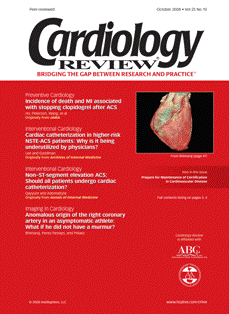Publication
Article
Cardiology Review® Online
Stopping clopidogrel after ACS: Impact on incidence of death and MI
Despite contemporary management, patients with acute coronary syndrome (ACS) remain at risk of recurrent adverse cardiovascular events.
Despite contemporary management, patients with acute coronary syndrome (ACS) remain at risk of recurrent adverse cardiovascular events. In the CURE (Clopidogrel in Unstable Angina to Prevent Recurrent Ischemic Events) study, which enrolled a mainly medically managed population, the incidence of cardiovascular death, myocardial infarction (MI), stroke, or recurrent angina exceeded 17% at 1 year.1 In the SYNERGY (Superior Yield of the New Strategy of Enoxaparin, Revascularization and Glycoprotein IIb/IIIa Inhibitors) trial, in which ACS patients were treated with percutaneous coronary intervention (PCI), the death and MI rates at 6 months also reached 17%.2 A more recent concern is that patients who are undergoing PCI and receiving drug-eluting stents (DES) may experience stent thrombosis months and years after stent implantation, which is associated with a high rate of morbidity and mortality. In this setting, a premature discontinuation of clopidogrel has been identified as the single most important predictor of late DES thrombosis.3 Current American College of Cardiology/American Heart Association guidelines support the administration of clopidogrel (Plavix) in addition to aspirin for all patients with ACS, as long as they are not at increased risk of bleeding.4 Nevertheless, it is becoming tempting to administer clopidogrel beyond the 1-year limit, at the cost of increased bleeding complications.5 It is critical for clinicians to understand the link between clopidogrel discontinuation and ischemic events in the setting of both ACS and PCI to adequately prevent late ischemic events.
Ho and colleagues conducted a retrospective study to determine the occurrence of adverse events among 3137 ACS patients, half of which were treated conservatively and half of which underwent PCI, in relation to clopidogrel administration. They stratified the incidence of death or MI at 0 to 90 days, 91 to 180 days, and 181 to 270 days from clopidogrel discontinuation. Among medically treated patients, 60.8% of adverse events (death or MI) occurred at 0 to 90 days, 21.3% at 91 to 180 days, and 9.7% at 181 to 270 days. Among PCI-treated patients, the rates were 58.9%, 23.4%, and 6.5%, respectively. In a multivariable analysis including adjustment for the duration of clopidogrel treatment, the first 90-day interval after stopping the drug was associated with a significantly higher risk of adverse events compared with the 91- to 180-day interval for both medically managed and PCI patients (incidence rate ratio, 1.98 and 1.82, respectively). The authors suggested that the clustering of adverse events in the initial 90 days after stopping clopidogrel was the result of a clopidogrel rebound effect.
The fact that the highest incidence of death or MI was observed approximately 45 days after discontinuation of clopidogrel argues against a rebound effect.6 Since the platelet inhibitory effect of clopidogrel lasts for 5 to 7 days, the expected clustering of adverse events should have occurred earlier. Accordingly, a 2004 analysis that hypothesized a clopidogrel rebound effect documented that the mean delay between drug discontinuation and admission for ACS was 12 days.7 The alternative mechanism underlying the increased event rates between day 0 and day 90 described in the article by Ho and colleagues may be the disappearance of the protective-preventive effect on cardiovascular events in patients receiving dual antiplatelet therapy. Prospective trials addressing different duration of clopidogrel treatment as well as newer antiplatelet agents are needed to determine the optimal length of combined antiplatelet treatment in patients with ACS. This will be determined by the trade-off between the reduction in ischemic events and the inevitable increase in bleeding complications. Based on the available data, it seems reasonable to administer dual antiplatelet therapy with aspirin and clopidogrel for 1 year after ACS, if the patient is not at increased risk of bleeding. Currently, it seems premature to extend clopidogrel treatment beyond 1 year in ACS patients.






